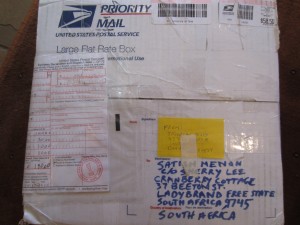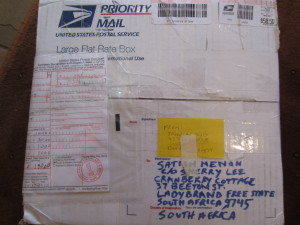
If you’re traveling for a longer length of time, it may make sense to ship items that you may need for baby that you won’t be able to purchase, particularly if you are heading to a developing country with more limited access to baby supplies. This can be an expensive option, but if you find yourself without something critical, it might be your only option.
We traveled last fall to Amman for six weeks, after which we had planned on going back to Chicago for a week, and then on to South Africa. We decided to spare our baby adjusting to time zones and a couple of really long trans-Atlantic flights, and headed directly from Jordan to South Africa. This meant, however, that I ran out of supplies as I had budgeted for 7 weeks away, rather than 11-12. I needed prenatal vitamins and food and clothes for Veda, as she was outgrowing her clothes we had along with us.
Some of the things I could have purchased either in Amman or in South Africa. Pre-natal vitamins are available, but the ones I found were bright purple, which I was not keen on ingesting. I also can make my own baby food for Veda and she often eats what we are having, but produce is sometimes limited and availability can change daily where we stay in South Africa, so I like to have some nutritious back-up supply of food. I can buy baby food, as well, but it’s overly processed and expensive.

I had a friend put together a small care package with these items and a few other toiletries in a large-sized U.S. postal service box. It took two weeks to ship from Chicago to Ladybrand, South Africa, and cost US$60. In addition, I paid another US$120 in customs fees (which I was irate about) to South Africa Customs when I picked up my package from the post office. If you ship anything, or have anyone ship anything to you for personal use do not declare monetary value and clearly write “No commercial value- for personal use” to avoid paying crazy customs fees. We encountered a similar issue in paying high customs fees when we were receiving a package in India.
You might weigh the option of shipping via FedEx, DHL, or UPS, to avoid these issues. It will be more expensive, but is generally a safer way to ship your items than through USPS, and they generally will cover potential customs costs along with the shipping cost paid.
Always bring a little extra of supplies you know you will not be able to find at your destination (I usually pack 1-2 weeks extra of supplies). If you’re expecting any visitors at your destination at a known time, also consider packing a small suitcase of supplies you know that you will need to replenish and give it to your visitor before you leave.
Related Pages:
13 Baby Essentials That May Be Hard to Find When You Arrive

2 thoughts on “To Ship or Not to Ship?”